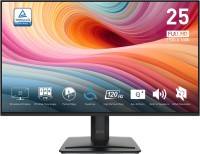Монітори MSI серії Optix
ціни на 25 моделейMSI Optix
Тайванський гігант MSI ніколи не мав великої ваги на ринку моніторів, зосередивши свій вплив на відеокартах, материнських платах і ноутбуках для фанатів відеоігор. Але чим популярнішою і доступнішою ставала геймерська Периферія, тим сильніше розширювалася експансія компанії на інші ринки. Всього 5 років знадобилося компанії, щоб заробити вагу і зайняти чільне місце під сонцем. В результаті цього монітори MSI Optix стабільно входять в топи продажів ігрової периферії і регулярно потрапляють у всілякі добірки кращих моніторів для відеоігор.
 |
Секрет успіху серії полягає в поєднанні декількох факторів. По-перше, це були одні з перших стильних і безрамкових моніторів початкового рівня. По-друге, на борту Optix завжди є все, що потрібно простому геймеру (FreeSync, висока герцовка і т.д.). Завдяки цьому монітори компанії заробили серйозну репутацію серед покупців: купивши такий, у вас навряд чи з'являться привід відчувати себе обдуреним. По-третє, MSI була однією з перших компаній, яка серйозно поставилася до передачі кольору навіть в бюджетних панелях. В результаті цього монітори серії можна рекомендувати не тільки для ігор, але і для базової фотообробки, монтажу та іншої роботи з візуальним контентом.
До інших переваг серії Optix можна віднести цікавий дизайн, який одночасно поєднує в собі зухвалість і стриманість, нагадуючи кращі зразки офісних та ігрових моніторів. Системні функції лінійки Optix найчастіше включають в себе підтримку AMD FreeSync, HDR і якихось чисто ігрових функцій на зразок фіксованого прицілу або режиму Night Vision. Додаткове оснащення може включати в себе USB-хаб з USB-C. Що стосується модельного ряду, то у продажу домінують IPS-панелі діагоналлю 24 – 27 дюймів. Рідше у продажу зустрічаються великі 30-34-дюймові va-Монітори.


